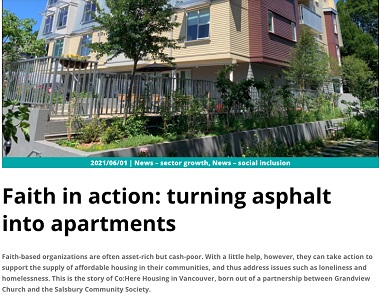
Co:Here began as an affordable housing project at 1st and Victoria and now has created a foundation to help other faith-based groups develop their properties.
Across Canada, a number of congregations which own buildings are on the verge of folding or ending. Complications from COVID-19 and resulting restrictions have exposed and accelerated the demise of certain models of church prominent during Christendom.
In these models, the focus is upon the gathered worship life of the church – without much emphasis on practices of formation leading to a missional life as persons and communities.
The operating idea of many churches was similar to the philosophy expressed in the movie Field of Dreams: “If we build it, they will come.” For most churches and many regions of the country, this is far removed from current reality.
Steward the land
While the loss of a worshipping congregation may bring a sense of grief and loss to those who ‘close the doors of the church building,’ it raises the question of how better to steward the land and buildings that all churches hold.
Indeed, Dr. Jason McKinney challenges churches to “hold” rather than “have” property. That is, he calls communities to see these as gifts of God for the good of God’s kingdom of peace and justice rather than as commodities to use for our own group’s benefit. (Listen to Jason’s excellent talk about church properties here.)
If we recognize that we have this responsibility to hold rather than have these lands and buildings, what other options are there for them?
1. Give or join
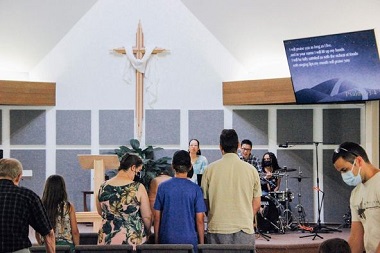
The Tapestry Mundy Park is now thriving.
Give the building to a new church plant or better yet, join them in this effort.
The Tapestry Mundy Park in Coquitlam serves as an example of this route when a Reformed, mostly Dutch and declining congregation joined a new church plant from Tapestry.
As a result, there now exists, three years later, a vibrant, blended, multicultural congregation which is making fruitful use of that building, not only for worship but also for preparing meals and offering tutoring.
2. Sell to benefit neighbourhood
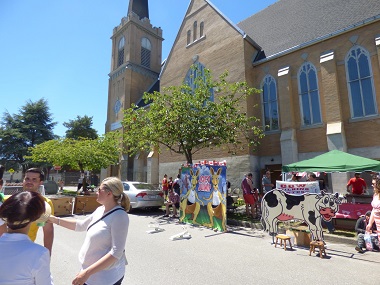
Strathcona Church now hosts several congregations.
Sell the building to individuals or groups who will retain the building for kingdom and community use, possibly renting the building back for worship and other gatherings of the congregation.
Examples here include Strathcona Church, which was on its way to being sold to private developers. The church building was purchased by Marion Man and leased back to various congregations – including Strathcona Vineyard, Mosaic and The Way (as well as Union Gospel Mission during their building program) – who inhabit that neighbourhood for good.

Graham Singh is CEO of Trinity Centres Foundation.
(Marion and the Strathcona Church board are now looking for an executive director who will assist in widening the use of this building for God’s restoring work in the Downtown Eastside.)
Another example is the vision of Trinity Centres Foundation (TCF) to purchase buildings across Canada from congregations which are not well set up for property management.
TCF then redevelops and repurposes those buildings for neighbourhood good, often leasing space back to the worshipping congregation(s).
Graham Singh, the founder of Trinity Centres Foundation, often asks the provocative question – should all churches be in the property management business, given their mission?
3. Remain and share
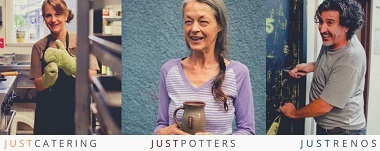
Three social enterprises which have been birthed out of Grandview Church.
For churches that do retain their buildings and remain in the property management business, there is an opportunity to use these resources for their own neighbourhood programs or initiatives as well as to partner with other agencies in seeking the well-being of our cities and towns.
Examples abound; churches use their buildings for:
- developing common practices of prayer and discipleship;
- making sacred space available for the public;
- nurturing the arts in all their forms (dance, visual, music, theatre);
- partnering with agencies both ‘secular and sacred’ seeking to offer love and care for those on the margins including community meals, support for single parents and overnight shelter.
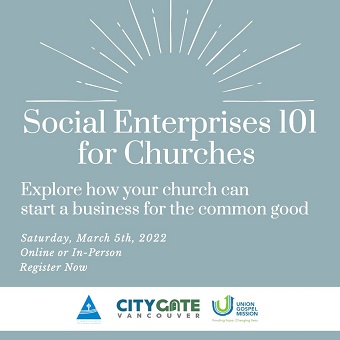 This Saturday morning (March 5), CityGate, UGM and the Centre for Missional Leadership will be hosting Social Enterprises 101 for Churches.
This Saturday morning (March 5), CityGate, UGM and the Centre for Missional Leadership will be hosting Social Enterprises 101 for Churches.
Individuals and churches can explore developing social enterprises, in some cases operating out of church buildings. (Go here for more details and to register.)
Developing social enterprises is just one more creative way for congregations to use their buildings throughout the whole week.
4. Create affordable housing
As affordable housing becomes an oxymoron in places like Greater Toronto and Vancouver, many churches are exploring how to utilize their land assets for creating affordable housing.
As the price of land skyrockets, as the cost of developing underground parking recedes as a percentage of a housing project and as municipal governments reduce parking requirements, a number of churches are exploring how to build underground parking for their church use and affordable housing for their neighbourhoods.
An example here is the Co:Here building which offers a number of underground parking spaces for Grandview Church and a building with 26 units of affordable housing (16 of which are at social assistance rates).
The building also offers a floor of shared space, including a community kitchen, living room, dining room, office space, prayer space and guest room.
Explore affordable housing
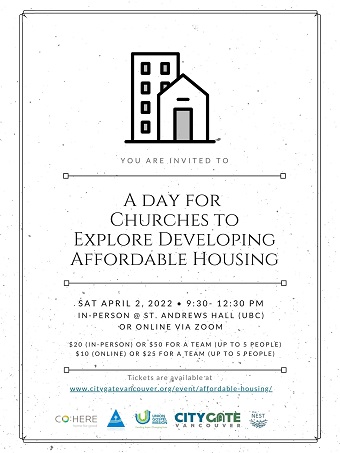 A number of emerging organizations assist churches in exploring and developing affordable housing, including Co:Here, The Nest, Parish Properties, the Anglican property development committee and the United Property Resource Corporation.
A number of emerging organizations assist churches in exploring and developing affordable housing, including Co:Here, The Nest, Parish Properties, the Anglican property development committee and the United Property Resource Corporation.
If you would like to explore using your land to develop affordable housing, join us April 2 to do just that. For registration, go here.
How is your church doing at holding and stewarding its land and building assets? If we lose these buildings and lands for kingdom / social purpose, we will add to the loss of the congregation itself.
There are better paths. Let’s pray that the Spirit moves us to this better way. It’s time for some selfless, creative kingdom imagination around our buildings and land.
Lent is a time of sober reflection preceding the events that would lead to Jesus’ death – and resurrection. Let’s take this season to reflect more deeply upon our buildings and land so that we might offer them back to God for God’s restoring purposes in the world.
Tim Dickau is director of CityGate Vancouver and an associate at the Centre for Missional Leadership. His latest book is Forming Christian Communities in a Secular Age.
